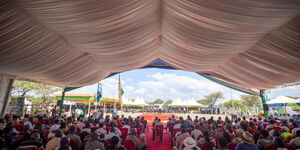A section of religious leaders from Kakamega County have made an appeal to President William Ruto to step in and save what they claim is a dwindling sugar industry in the county.
The leaders particularly pointed out Mumias Sugar and West Kenya companies as two of the biggest sugar producers who, despite their reputable names, were struggling to reap profits.
According to the religious leaders, Mumias Sugar has seen its sugar production plummet in recent years, with production limited to just 10 per cent of the miller's actual potential.
“As we speak, the management cannot run the sugar mill at full capacity. Before going under, Mumias Sugar was crushing 8,000 tonnes of sugarcane per day. Now, they are barely managing 800 tonnes,” Aliakim Otieno, a priest at the Bible Community Church in Mumias, said, insisting the company was in a dire state.
Further, Otieno blamed Mumias Sugar's woes on the lack of outgrower services, which are essentially support systems provided by the government to small-scale farmers (outgrowers) to produce sugar.
The lack of contracted small-scale farmers has led to unstable markets and a decline in productivity, according to the leaders.
The struggles of the Mumias Sugar Company are a bitter pill to swallow for farmers in Kakamega County, particularly because it comes barely three months after the president toured Western Kenya, where he issued Ksh150 million in bonuses to sugarcane farmers.
At the time, Ruto revealed that Mumias Sugar Company had been placed under new management in a bid to ensure that farmers produce more.
Adding to Miller's woes is the Ksh3.5 billion in unpaid taxes, which the Tax Appeals Tribunal allowed the Kenya Revenue Authority (KRA) to collect from Mumias Sugar. The taxes issued to Mumias Sugar included income tax, Pay-As-You-Earn (PAYE), withholding tax, excise duty, and VAT.
In light of these issues, the religious leaders now want an elaborate report from the receiver manager to clarify the company's financial status.
Previously, the Mumias Sugar receiver manager had challenged the assessments, citing a lack of access to pre-receivership records and alleged errors in the tax calculations.
However, in its judgment, the tribunal dismissed the appeal, finding that the receiver manager failed to provide sufficient evidence to prove the tax assessments were incorrect and that the tax assessments by the commissioner were justified.












